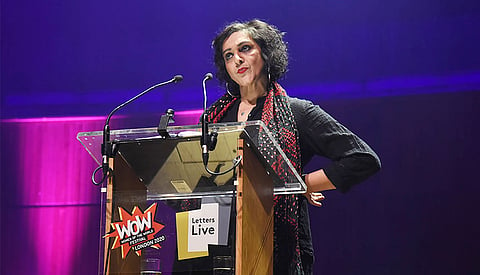

Actor, comic, writer, producer and filmmaker Meera Syal took a trip down memory lane recently as part of the UK Punjab Heritage Association's (UKPHA) celebration of the ongoing South Asian Heritage Month.
From playing “Ummi” in the Emmy award-winning 'The Kumars at No. 42' to smashing stereotypes in the BAFTA-nominated 'Goodness Gracious Me', Syal is recognised as a national treasure in the UK and Global Indian cultural icon the world over. During an exclusive virtual book club event in conversation with filmmaker and reporter Amandeep Kaur Bhangu, she explored aspects of her career and life that straddles different cultures and experiences.
Meera is widely recognised and celebrated for her part in the comedy sketch show 'Goodness Gracious Me', the ahead-of-its-time satire which paved the way for Indians in British television in the 1990s. The series, co-starring Sanjeev Bhaskar, Nina Wadia and Kulvinder Ghir, aired three seasons on prime-time BBC TV and was described by critics as the kind of comedy “everyone could relate to”. It radically transformed Asian stereotypes by offering a humorous take on it.
She recalls: “We didn't want to tell white people what brown people are like. We just wanted to be true to the new culture we thought we were forming. It felt like coming home, being in a room with a bunch of people who actually get you. Suddenly, you could ask: 'Do you have suitcases on the top shelves of your cupboards too ' and the answer was always yes, because they lived the same bi-cultural life as me! We didn't tailor it to be comfortable, we had one shot and we did it from the heart and passionately.
“You're given a label whether you want it or not. When there's so few of us in the public eye, we inevitably become representatives. This caused a lot of ruffling feathers because of the nature of the show. The answer isn't to shut us up; it is to make more programmes so that nothing we say is representative, it's just a version.”
'Bhaji on the Beach' was Meera's first venture into writing for television in 1993. Her brilliant comedic flare intermixed with serious and dark themes set the tone for her successful 27+ year acting and writing career.
“Acting and writing feed each other in a really good way. Even the smallest parts should have resonance.”
Meera shares that 'Bhaji on the Beach' was the easiest commission she ever pitched for as it was a time when Channel 4 had only just launched and their main objective was to platform ethnic minority voices.
“I wanted to show the amazing clash between newly arrived immigrants and the most British institutions, and because no one had ever really done anything like that before, the commissioning officer said 'yes' before I'd even finished my sentence.”
Despite rising to fame almost 30 years ago, Meera's work is still cherished by the youth today for the hope she inspires in young creatives in the diaspora.
“There doesn't seem to be proportionately much more opportunity for young Asian talent today. We expected that things would have moved on drastically, but there seems to be a bottleneck, a squeezing of talent. We have to unblock it.”
A running theme throughout Meera's work is that of strong, complex women.
She explains: “I grew up surrounded by strong, funny women, completely away from the clichés of what people think an Indian woman is.
“I didn't want to create endlessly suffering characters. I believe it's important to create difficult women because we're often not allowed to be that; we're often seen through an outsider's gaze. It seems obvious to say we're as human as anyone else, of course we are.
“My agent says it's never been a better time for women in the industry. I agree, for women it has got better. For women of colour, not so much. For South Asian women, we have a long way to go!”
Meera's most recent project 'The Greatest Wealth | 1960s: Rivers' premiered during the coronavirus lockdown on May 28, a 20-minute monologue described by Amandeep as “Meera at her finest”. The poignant piece of spoken word plays on “one of the greatest ironies of the 1960s - when Enoch Powell's made his infamous “Rivers of Blood” speech, which Meera remembers to have had a great impact on her parents.
“It was such a punch in the face to those ex-Commonwealth citizens who had migrated on invitation and were serving in the NHS leaving their own families behind. We know the stories, how hard it was when they arrived, what they still put up with now.”
She says she wrote the piece for her monologue in a day.
“I had been carrying around a lot of anger at how our current government had handled the pandemic and it echoed the experiences of our families all those years ago. It all came together at once.”
For cinema, Meera most recently played Himesh Patel's mother in Danny Boyle's 'Yesterday' last year.
“I was happy to be asked to do it. A Richard Curtis script, directed by Danny Boyle. I got to do a Suffolk accent too! Another thing that made me want to be part of it even more was that Himesh's part was not originally written as a brown man, but Danny Boyle recognised that Himesh was the best person for it.
“These sorts of casting decisions are what make all the difference.”
by Vidhu Sharma
*Info: UKPHA's virtual book club events will take place every Monday through South Asian Heritage Month.